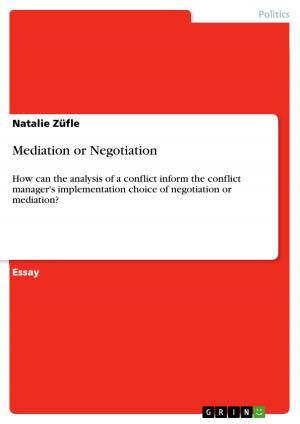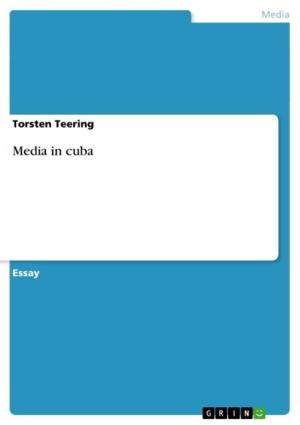| Author: | Sandra Schwesinger | ISBN: | 9783656264330 |
| Publisher: | GRIN Publishing | Publication: | August 29, 2012 |
| Imprint: | GRIN Publishing | Language: | English |
| Author: | Sandra Schwesinger |
| ISBN: | 9783656264330 |
| Publisher: | GRIN Publishing |
| Publication: | August 29, 2012 |
| Imprint: | GRIN Publishing |
| Language: | English |
Seminar paper from the year 2011 in the subject English Language and Literature Studies - Linguistics, grade: 1,0, University of Würzburg, language: English, abstract: 1. Introduction: Tense and aspect A foreign learner of the English language has to struggle with many tasks concerning vocabulary and grammar. Especially the correct usage of the verb phrase includes a highly difficult problem and has to be analysed very detailed. It includes not only the grammatical category of tense but as well the category of aspect, mood and voice. This paper is supposed to concentrate on the grammatical categories tense and aspect. Tense is used to express the location of an event or state in time. It can be divided into future, present and past tense. By contrast to that 'aspect' expresses the way in which the action or the state is experienced. It reflects the meaning of the verb in relation to time. That means it shows whether the action is finished or is still in progress. The English verb system includes the perfective aspect, the progressive aspect, the simple aspect and the perfect-progressive aspect. (Quirk et al. 1979: 40) In the following an overview of the tense past combined with the perfective aspect will be given. First of all the definitions of this tense and aspect will be compared in three different grammars: 'Meaning and the English Verb' by Leech, 'A Student's Grammar of the English Language' by Quirk and Greenbaum and 'Longman Student Grammar of spoken and written English' by Biber et al.. In the second part of the paper the application of the past perfect will be analysed in an excerpt of 'Harry Potter and the Prisoner of Azkaban' written by Joanne K. Rowling.
Seminar paper from the year 2011 in the subject English Language and Literature Studies - Linguistics, grade: 1,0, University of Würzburg, language: English, abstract: 1. Introduction: Tense and aspect A foreign learner of the English language has to struggle with many tasks concerning vocabulary and grammar. Especially the correct usage of the verb phrase includes a highly difficult problem and has to be analysed very detailed. It includes not only the grammatical category of tense but as well the category of aspect, mood and voice. This paper is supposed to concentrate on the grammatical categories tense and aspect. Tense is used to express the location of an event or state in time. It can be divided into future, present and past tense. By contrast to that 'aspect' expresses the way in which the action or the state is experienced. It reflects the meaning of the verb in relation to time. That means it shows whether the action is finished or is still in progress. The English verb system includes the perfective aspect, the progressive aspect, the simple aspect and the perfect-progressive aspect. (Quirk et al. 1979: 40) In the following an overview of the tense past combined with the perfective aspect will be given. First of all the definitions of this tense and aspect will be compared in three different grammars: 'Meaning and the English Verb' by Leech, 'A Student's Grammar of the English Language' by Quirk and Greenbaum and 'Longman Student Grammar of spoken and written English' by Biber et al.. In the second part of the paper the application of the past perfect will be analysed in an excerpt of 'Harry Potter and the Prisoner of Azkaban' written by Joanne K. Rowling.















